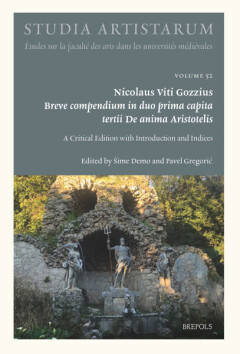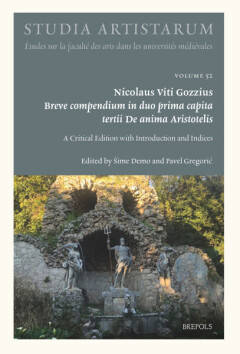
Je cadeautjes zeker op tijd in huis hebben voor de feestdagen? Kom langs in onze winkels en vind het perfecte geschenk!
- Afhalen na 1 uur in een winkel met voorraad
- Gratis thuislevering in België vanaf € 30
- Ruim aanbod met 7 miljoen producten
Je cadeautjes zeker op tijd in huis hebben voor de feestdagen? Kom langs in onze winkels en vind het perfecte geschenk!
- Afhalen na 1 uur in een winkel met voorraad
- Gratis thuislevering in België vanaf € 30
- Ruim aanbod met 7 miljoen producten
Zoeken
€ 74,20
+ 148 punten
Omschrijving
This is the first edition of Nikola Vitov Gucetic's (1549-1610) compendium of philosophical and theological problems arising from Aristotle's De anima Book 3, Chapter 4, where he begins his discussion of the thinking part of the soul, that is, the intellect (nous). With the interpretation of Averroes (1126-1198), this text has structured much of the debate on the immortality of the soul in the Middle Ages and the Renaissance. Gucetic's Breve compendium is a testament to these debates, interesting for its selection of issues for discussion in connection with Aristotle's text, and for its open defence of the Averroist position in the late decades of the 16th century. Although Gucetic had a preliminary arrangement with Aldo Manuzio the Younger to print this text around 1590, at some point he abandoned the plan to publish it. The main purpose of this book is to provide a critical edition of the Latin text for scholars in the humanities, especially historians of late Medieval and Renaissance philosophy. The edition is accompanied by an introductory study that places the author and his work in the historical and intellectual context, describes the manuscript, and gives a detailed synopsis of the work. This will make the book useful also to students of the humanities and those interested in the history and culture of Dubrovnik.
Specificaties
Betrokkenen
- Auteur(s):
- Uitgeverij:
Inhoud
- Aantal bladzijden:
- 134
- Taal:
- Frans
- Reeks:
- Reeksnummer:
- nr. 52
Eigenschappen
- Productcode (EAN):
- 9782503607580
- Verschijningsdatum:
- 9/12/2024
- Uitvoering:
- Hardcover
- Formaat:
- Genaaid
- Gewicht:
- 1469 g

Alleen bij Standaard Boekhandel
+ 148 punten op je klantenkaart van Standaard Boekhandel
Beoordelingen
We publiceren alleen reviews die voldoen aan de voorwaarden voor reviews. Bekijk onze voorwaarden voor reviews.









